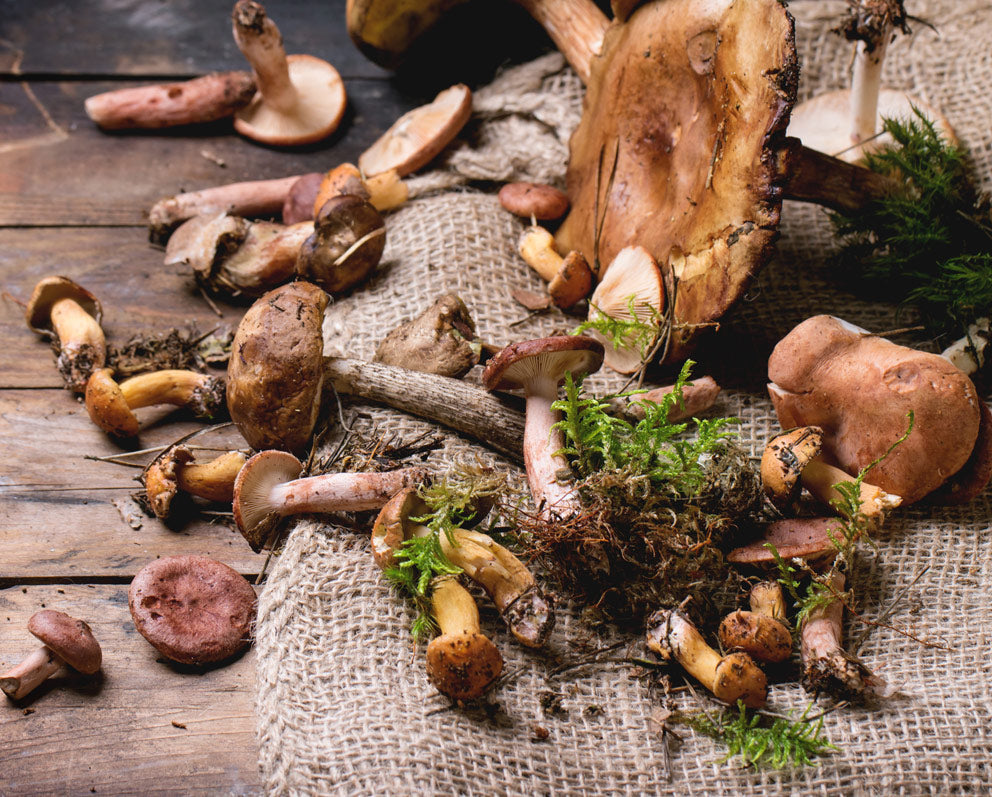Reishi, maitake, and cordyceps are members of a group of medicinal fungi or mushrooms that have been used in Asia for centuries as longevity tonics, immune system boosters and health promoting effects. Reishi mushrooms in particular, are one of the major Chinese tonics dating back to 200 BC.
Over millions of years, mushrooms have protected themselves with substances that prevent harmful organisms from replicating in their cells. Twenty-two centuries ago, Chinese Emperor Ti instructed a fleet of ships to sail the Eastern seas in search of the Reishi (Ling zhi) mushroom as it was believed to give long life and immortally. Medicinal mushrooms in fact mimic human respiration by capturing oxygen and exhaling carbon dioxide. Our immune systems have evolved alongside fungal pathogens and pharmacological research shows that polysaccharides (long chains of sugar molecules) found in medicinal mushrooms protect human health.
Medicinal mushrooms have various effects, including boosting the body’s immune system, lowering cholesterol, acting as an anticoagulant and playing a supportive role in the treatment of cancer.
Most medicinal mushrooms contain a substance known as 1,3/1,6 β‐ glucan, a polysaccharide with immune effects. β‐glucans can be found in the cellulose walls of plants, cereal bran, as well as, fungus and bacteria, but the existing 1-3, 1-6 β‐ glucan links are what makes these B-glucan’s all important and effective on the immune system. In particular, fungal β‐glucan induced immune responses appear to act by stimulating the whole immune system. In medicinal mushrooms most β‐glucans contain other sugars (and so are hetero β‐glucans) and also have bound protein components (proteoglycans). The terms polysaccharides, proteoglycans and β‐glucans are used interchangeably in commercial literature. β‐glucans act on several immune receptors and can trigger a group of immune cells including macrophages, neutrophils, monocytes, natural killer cells and dendritic cells. Both innate and adaptive immune response can be modulated by β‐glucans and they can also enhance phagocytosis (the ingestion of bacteria or viruses in our immune system).
Maitake
Commonly know as, “Hen of the woods or Dancing Mushroom”. Maitake is traditionally a Chinese and Japanese culinary mushroom. The polysaccharides in Maitake are resistant to degradation by stomach acids and enzymes, making oral ingestion highly effective.
Key benefits:
- Maitake activates the immune system to defend against bacterial and viral infections.
- Protects normal cells from succumbing to environmental carcinogens.
- Immune modulation- supports healthy immune function
- Strengthens the adrenal glands
Therapeutic uses:
- Diabetes: improves glucose tolerance
- Cancer: inhibits environmental carcinogens, induces release of cytokines, inhibits metastasis and tumors, stimulates T-cells
- Helps with chronic fatigue
- Balances blood sugar levels
- Controls Candida
- Hypertension
Contraindications
Maitake might lower blood glucose levels and may have additive effects* when used with other herbs, supplements or drugs that also lower glucose levels. Do not use if allergic to mushrooms or other members of the fungi family.
*Vitamin C reportedly improves Maitake absorption and effectiveness.
Reishi:
Commonly know as the “Mushroom of immortality”. Reishi is revered as one of the outstanding tonic herbs. An excellent mushroom for supporting a healthy immune system, particularly recommended for allergies, hay fever and sinus issues. Reishi has two active polysaccharides called beta-glucans which have immune modulating effects and triterpenes which have anti-inflammatory and anti-histamine effects.
Key benefits:
Reishi polysaccharides such as beta‐glucan and triterpenes are reported to have:
Antitumor activity
- Stimulate the activities of macrophages and T lymphocytes
- Stimulates anti-allergic activity
- Aid sleep and relaxation
Therapeutic uses:
- Anti-allergy & hay fever
- Allergic rhinitis, allergic asthma, blocked sinus
- Anti-inflammatory (i.e. rheumatoid arthritis)
- Sedative (traditionally indicated for the treatment of insomnia and anxiety)
- Immune support
Contraindications:
Combining higher doses of Reishi with anticoagulant or antiplatelet drugs activity may increase the risk of bleeding. Concurrent use of Reishi with anti-hypertensive drugs might increase the risk of hypotension. Do not use if allergic to mushrooms or other members of the fungi family.
Cordyceps:
Cordyceps is a well-known medicinal mushroom from high in the Himalayas that help to maintain normal energy levels, lung and liver function plus antiviral responses.
Key benefits:
- May increase athletic performance
- Antiviral properties
- Supports lung, liver & kidney function
- Improves fatigue - increases oxygen delivery and acts as an adrenal restorer
- May improve sexual performance
Therapeutic uses:
- Asthma, chronic cough & wheezing
- Poor endurance and stamina
- Fatigue
- Impotence, sexual dysfunction, reduced libido and infertility
Contraindications:
Not recommended if you suffer from BPH (Benign prostatic hyperplasis) or prostate or breast cancer. No known drug interactions.
Chaga:
Chaga is the Russian word for ‘Mushroom’ and is the father of all Mushrooms being traditionally used in Russia as a potent antioxidant and anti-inflammatory tonic. It is unique as two active ingredients, B glucans and Betulinic acid, give this mushroom its very powerful antioxidant properties. Chaga has a high ORAC of 52,000 (how antioxidants are measured) similar to blueberry extract. It also has 50 times more superoxide dismutase (SOD -antioxidant enzyme) than other medicinal mushrooms.
Chaga helps to support the gastrointestinal health and integrity of blood vessels. It also has huge anti-oxidant and anti-inflammatory properties, as well as, supports the immune system.
Key benefits:
- Boost Immune system-increase lymphocytes, anti viral-herpes virus
- Lowers inflammation, aids muscle and joint recovery times from exercise
- Reduces symptoms of diabetes
- Suppress cancer progression, reduced tumours by 60% compared with control for lung cancer
- Aid recovery time for athletes, with less reduction in energy stores
- Reduced symptoms of diabetes
- Anti-septic properties
- Reduce LDL ‘bad’ cholesterol
- High in anti-oxidants. One typical dose =30lb of carrots.
- Helps promote shiny, thick hair and glowing skin



